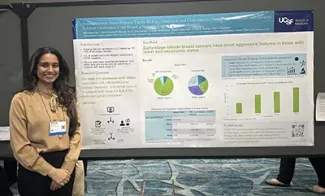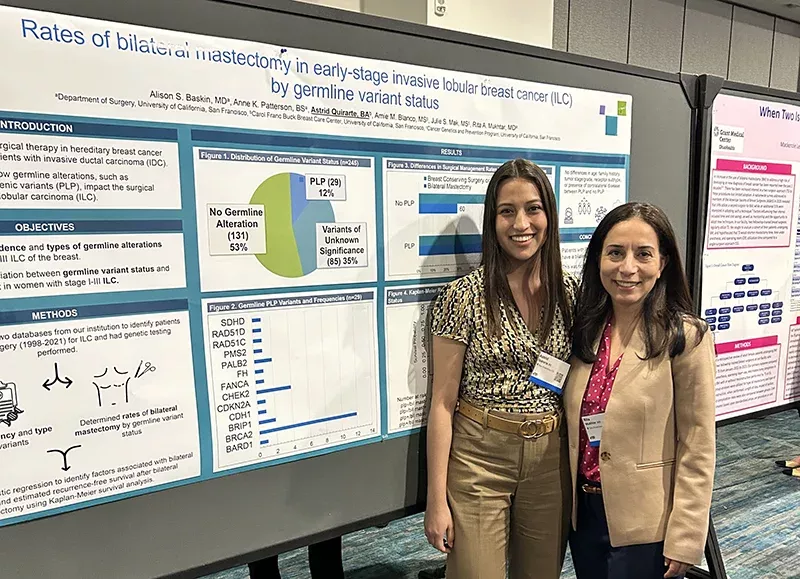Lobular Research
Lobular Research
Clinical Trials
Related Conditions: Breast Cancer| Start Date: | End Date:
- MammaPrint, BluePrint, and Full-genome Data Linked With Clinical Data to Evaluate New Gene EXpression Profiles (NCT03053193)
Related Conditions: Breast Cancer| Start Date: | End Date:
Related Conditions: Breast Cancer| Start Date: | End Date:
Related Conditions: Breast Cancer, Carcinoma| Start Date: | End Date:
Research Papers / Posters

Socioeconomic Status Impacts Tumor Biology, Treatment, and Outcomes in Over 200,000 Patients with Invasive Lobular Carcinoma of the Breast: a National Cancer Database Analysis
Invasive lobular carcinoma (ILC) is known to be a hormone receptor positive and HER2 receptor negative breast cancer. Our analysis showed that the characteristics of early stage (I-III) ILC can vary by socioeconomic status (SES, which we measured using education and income). In this cohort of over 200,000 patients with ILC in the National Cancer Database, we found that low SES was associated with fewer hormone positive and higher-grade tumors.
Quantifying estrogen and progesterone receptor status in early-stage invasive lobular carcinoma of the breast: associated factors and outcomes in an institutional series
We are interested in understanding the distribution and the clinical significance of ER/PR hormone receptor positivity in early-stage ILC. Overall, we know that ILC is typically regarded as strongly ER and PR positive and there is very little data that exists evaluating the spectrum of hormone receptor positivity in ILC. Using a single institution prospectively maintained ILC database, we evaluated patient characteristics, tumor features, and disease-free survival of patients based on different levels of ER and PR receptor positivity.
Self-identified race and Area Deprivation Index in patients with invasive lobular carcinoma of the breast: associations with tumor characteristics and event free survival
A recent analysis of the SEER database showed that racial/ethnic identity is associated with worse outcomes in those with ILC. We wanted to validate these findings in our institutional database of ILC patients and investigate whether including socioeconomic factors, measured using the Area Deprivation Index (ADI), would influence the associations between race and outcomes.
HER2-low status in early stage ILC
The concept of HER2-low breast cancer has been proposed as a potential treatment target for breast cancers previously considered HER2-negative. In recent clinical trials, patients with HER2-low status have benefited from new therapeutic compounds that target HER2. However, the clinical implications of HER2-low status in invasive lobular carcinoma (ILC) has not been explored before. In this study we looked at survival outcomes and treatment characteristics of patients with stage I-III ILC based on HER2 status.
Rates of bilateral mastectomy in early-stage invasive lobular breast cancer (ILC) by germline variant status
Currently, there is limited data on how germline alterations impact the surgical management of women with ILC. In this study, we wanted to look at the presence of germline alterations and their associations in early stage ILC. We define germline alterations as whether a patient has a pathogenic variant, a variant of unknown significance, or no germline alteration. Our study found that patients with pathogenic variants are more likely to have a bilateral mastectomy and this was not explained by patient factors, tumor factors, or the presence of contralateral malignancy. Ultimately, we want to replicate this in a multi-institutional setting to see if these same factors are observed.

Photo caption: UCSF Lobular Breast Cancer Research Program Principal Investigator Dr. Rita Mukhtar and Breast Care Center Intern, Astrid Quirarte at the 25th Annual American Society of Breast Surgeons Meeting.
Oncologic Safety of Immediate Oncoplastic Surgery Compared to Standard Breast Conserving Surgery for Patients with Invasive Lobular Carcinoma
Israel Falade, a mentee of Dr. Mukhtar, a Lobular Breast Cancer Research Fellow, recently won the Long-Term Dean’s Prize in Research and Scholarship for his work on 'Oncologic Safety of Immediate Oncoplastic Surgery Compared to Standard Breast Conserving Surgery for Patients with Invasive Lobular Carcinoma.' Awarded to only five medical students each year, the prestigious Dean’s Prize recognizes outstanding scholarship and research. This project was presented at the 25th Annual Meeting of the American Society of Breast Surgeons and the manuscript has since been accepted to the Annals of Surgical Oncology.
His project investigated the oncological outcomes of immediate oncoplastic surgery in patients with invasive lobular carcinoma, revealing that immediate oncoplastic surgery was associated with improved surgical outcomes and did not adversely impact recurrence-free survival, confirming its oncologic safety.
Surveillance strategies after primary treatment for patients with invasive lobular carcinoma of the breast: method of local recurrence detection after breast conserving surgery
This study looked at our well-maintained invasive lobular carcinoma (ILC) database to identify patients who had a recurrence at breast conserving surgery for ILC. We analyzed both the surveillance imaging methods of this cohort, including mammography, MRI, or no imaging, and how the recurrence was discovered, either screen-detected or clinically (also known as interval cancers). We found that the interval cancer rate was significantly higher in the mammogram surveillance group compared to MRI surveillance group (61.9% versus 16.7%), suggesting that breast MRI may have utility for surveillance imaging for those with a prior history breast conserving surgery for invasive lobular carcinoma of the breast.
The Role of Clipping the Lymph Node in Clinically Node Positive Patients Treated with Neoadjuvant Chemotherapy for Breast Cancer: Impact on Axillary Surgery in the ISPY-2 Clinical Trial
Medical student, Kayla Switalla, was recently honored with The American Society of Breast Surgeons’ Outstanding Scientific Presentation Award at their 25th Annual Meeting for her research on "The Role of Clipping the Lymph Node in Clinically Node Positive Patients Treated with Neoadjuvant Chemotherapy for Breast Cancer: Impact on Axillary Surgery in the ISPY-2 Clinical Trial.” This award is presented to the most outstanding oral presentation by a medical student, resident, or fellow during the conference. Kayla conducted this research under the mentorship of Rita Mukhtar, MD, an associate professor at UCSF in the Division of Surgical Oncology.
Kayla is a fourth-year medical student at the University of Minnesota who received a year-long UCSF Lobular Breast Cancer Research Program Fellowship (2023-2024) to conduct research with Dr. Mukhtar. Kayla is interested in general surgery and plans to continue her work in residency as an academic scientist. Dr. Mukhtar’s steadfast commitment to her mentees’ development and her ongoing support of their research projects underscore her role as an exemplary mentor. Congrats to all!
